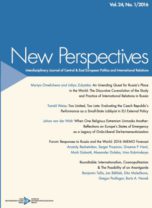Deter and Engage: Making the Case for Harmel 2.0 as NATO’s New Strategy
Deter and Engage: Making the Case for Harmel 2.0 as NATO’s New Strategy
Author(s): Ulrich KühnSubject(s): Politics / Political Sciences
Published by: Ústav mezinárodních vztahů
Keywords: NATO; Russia; international security; Harmel Report; defence; cooperation
Summary/Abstract: This intervention argues that NATOneeds a new strategy towards Russia. The current strategy is imbalanced because it over-emphasizes power and risks negatively affecting the European security order. A new strategy should recall the 1967 Harmel Report, which successfully combined the security elements of power, order, and liberal values. Today, such a balanced strategy is again needed. A new Harmel strategy (Harmel 2.0) should, like its predecessor, rely on a combination of deterrence and engagement. This intervention thus argues that in the realm of power, NATO needs to respond to Russia’s hybrid warfare threats with conventional reassurance and societal soft power measures and that securing the Allies’ economic vulnerabilities while leaving NATO’s current nuclear posture untouched will also be crucial. In the realm of order, NATO needs to re-engage on cooperative security and the instruments of arms control, and it is argued that a pause to further NATO enlargement would be helpful. Finally, in the realm of liberal values, the Allies should lower their expectations as a gesture of recognition that they cannot change the domestic situation in Russia in the short term, but they should address the attitudes of certain member states in that realm. In order to succeed with such a multi-pronged strategy, the Allies need to better coordinate their policies in the OSCE and amongst EU countries.
- Issue Year: 23/2015
- Issue No: 1
- Page Range: 127-157
- Page Count: 31
- Language: English
- Content File-PDF

